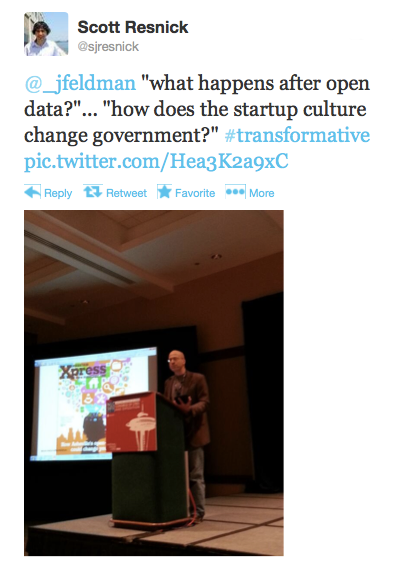I’m just returning from a lightning talk and World Cafe session at the National League of Cities Congress of Cities in Seattle, and thought it would be helpful to jot down some thoughts while they’re fresh in my mind.
The theme of the session was, “Engaging Residents in Solutions: Using Data and Technology to Improve Local Government.”
I was honored to be among some distinguished folks. Harvard Kennedy School’s Stephen Goldsmith stole the show with the best line of the conference when an audience member asked “to what extent should government official’s emails be open?” Goldsmith quipped, “He’s really asking ‘how much democracy can you tolerate?’ ” Ha!
Alisha Green, a policy associate with the Sunlight Foundation, introduced the audience to the Foundation’s open data policy guidelines.
Jeanne Holm, an evangelist with Data.gov, described cities.data.gov, which federates city data. Pretty cool. And Scott Resnick, a forward-thinking city councilman in Madison, WI, described four ideas to implement more open government in your city for under $5000.
Here’s a summary of what I talked about.
 Open data, of course , offers a really compelling value proposition for not only citizens but for government staff. That’s great, but digging a little deeper,open data and public technology in general are itches that we scratch because we want government to change, right?
Open data, of course , offers a really compelling value proposition for not only citizens but for government staff. That’s great, but digging a little deeper,open data and public technology in general are itches that we scratch because we want government to change, right?
Trouble is, if you want to change government, you need to involve people other than the usual suspects. Government staff, chambers of commerce, and elected officials all have an important role, but they’re part of the status quo. I’m not busting on them, but they’re part of “what is”, and don’t have a lot of incentive to build “what will be.” They’re making laser printers in the dawning age of the ink-jet printer. Some will get on board, and some will be disrupted.
One of the things that I learned by doing community events like Asheville’s Open Data Day is that meaningful local government — also known as civic action or public good — happens when different groups of people from government, not-for-profits, business, and other sectors get together, agree to make something happen, and then follow through to make it happen. I’ve seen it as a multiple Startup Weekend organizer, I’ve seen it as a participant in the National Day of Civic Hacking, and I’ve seen it as an Open Data Day organizer.
Governments that involve public technology and startup culture can help make that happen more often, and more effectively.
As Tim O’Reilly has said many times, government is a platform. Open data is an important enabling part of the platform, but there’s more than just open data that needs to be a part of the platform. Ultimately, we want government to be able to occasionally delight, not just satisfy public needs.
When a citizen realizes that she can spend 15 seconds snapping a picture of a problem like a pothole or graffiti with a follow-up notification automatically sent when the problem has been fixed — instead of calling a call center, waiting on hold, explaining the problem, wrestling with the operator about spelling their name, or which street address the problem is near — that citizen is delighted.
Good IT and good startup folks have the urge to delight. Including more of them in government and civic engagement is a great idea. And, good IT folks are pretty awesome at improving business process, and good startup folks are pretty awesome at product launches. Every time we say that we want to “fix government”, what else are we doing besides fixing a business process or launching a new product or service?
I went on to recommend some books that the city managers and elected officials should read for more ideas and information including Rework, The Startup of You, Lean Startup, and Startup Weekend, and my columns on Code for America and running government IT — and perhaps government itself — like a startup. During the World Cafe session, I also responded to someone who brought up the usual “startups = failure” objection, and referred him to my column on “Startup Culture And Innovation, Defended.”
Years ago, when I first started talking about open data and startup techniques in government, I got a lot of blank stares. But at NLC, talking to a variety of elected officials and city managers, I came away very heartened — I think there are many who are open to positive changes.
[…] I really enjoyed having a quick lunch with some of my co-presenters after our lightning talks over the past weekend at the National League of Cities Congress (“Engaging Residents in Solutions: Using Data and Technology to Improve Local Government.”) […]